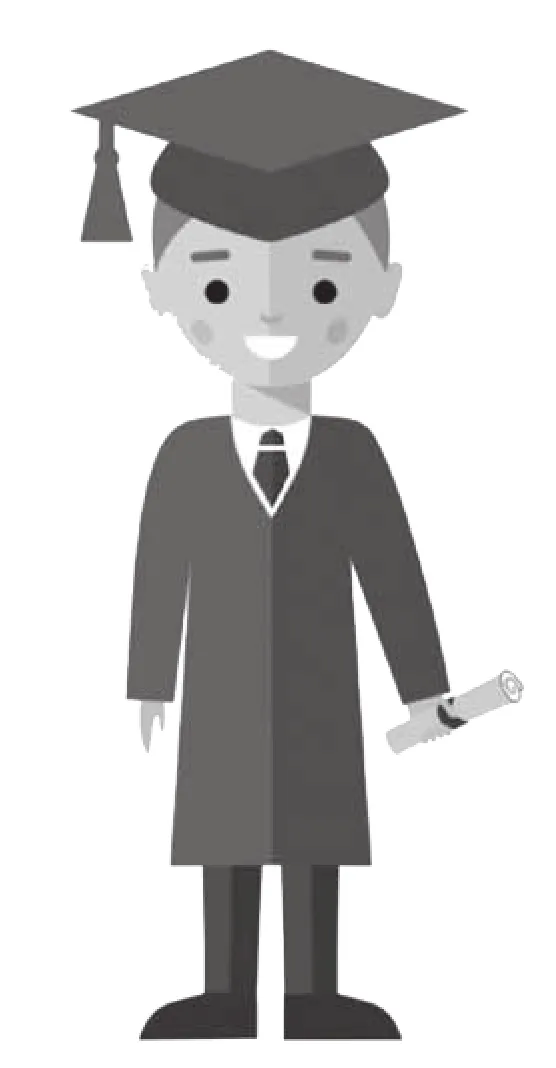中考英语单项选择步步走(下)
2017-12-06陈传光供稿
陈传光供稿
中考英语单项选择步步走(下)
陈传光供稿

九大单项选择突破法
1. 直接判定法
直接判定法就是运用所学的英语知识,结合题目所提供的信息,从各个选项中直接选出正确答案。无论是什么性质的英语测试,选择填空题都会有一部分对基础知识进行考查的题目,有时仅看题干便能知道正确答案是什么。对于这样的题目,同学们应眼疾手快,一眼看准后就立即作出选择,以便节省出更多的时间去对付其他难题。
【例】Could I borrow ________ eraser, please? ________ is broken.
A. your; My B. yours; Mine C. yours; My D. your; Mine
【解析】第一空之后的eraser是名词,所以此空显然要填形容词性物主代词;第二空中的词是句子的主语,因此无疑要用名词性物主代词。故选D。
2. 排除法
此法又称筛选法。如果同学们在通读完题干并且弄清题意后,仍对四个选项举棋不定,那么不妨采取“逐一排除”的方法。你可以将所给选项一一放到空格处,经过仔细分析后再将所有干扰项筛选掉。
【例】He does his homework much ________ than he did two years ago.
A. careful B. more careful C. carefully D. more carefully
【解析】空格处位于主句的状语位置,修饰动词does,又因为后面的从句用than引导,是比较状语从句,所以应选择副词比较级。A项和B项分别是形容词原级和比较级,应排除;C项是副词的原级,同样予以排除。故D项为正确答案。
3. 前后照应法
前后照应法实际上是借助语境来解题的一种方法。此法要求大家在答题前首先应弄清楚题干的意思,然后根据上下文之间的关系,捕捉暗示的信息,从而得出正确答案。
【例】It takes ________ to go to Japan by air than by ship.
A. little time B. less time C. more time D. much time
【解析】如果不看空格处后面的部分,四个选项均可填入,但通读题干便可知该句句意为“坐飞机去日本比坐船花的时间要少”,即可确定答案。题目中的“by air than by ship”便是解答该题的暗示信息。答案为B。
4. 逻辑推理法
有些题目的选项,从语法上看似乎答案不止一个,有的甚至全部都可入选。但将某个答案套入选项,句意其实并不符合逻辑,此时同学们需要通过逻辑推理才能将错误选项排除。
【例】We are tired. Let’s stop ________ and have a rest.
A. to working B. work C. to work D. working
【解析】单纯从语法角度考虑,C、D两项都对。然而C项不符合逻辑,与后面的“have a rest”是矛盾的,所以正确答案为D。
5. 固定结构判断法
有些题目考查固定搭配和习惯用法。同学们在做这类题目时,应注意摆脱汉语习惯的干扰。
【例】—You aren’t a student, are you?
—No, I ________.
A. am B. am not C. was D. wasn’t
【解析】由于时态和前面的反意疑问句不一致,所以C项和D项都不是正确答案。如果选A,则违反了英语习惯。按照英语习惯,回答反意疑问句时必须前后一致,即前面如果答no,那么后面必须跟否定形式。故B项为正确答案。
6. 句型转换法
有些题目不太直观,很难让人立刻找出正确答案。这时大家可以将句子进行延伸或者做一下变换,使其“原形毕露”,答案马上就能确定了。
【例】—Can I help you?
—Well, I’m afraid the box is ________ heavy for you, but thank you all the same.
A. so B. much C. very D. too
【解析】本题中的四个选项都是表示“很,十分”的副词,在用法上十分接近。但如果同学们能够将“for you”还原为“for you to carry”,再联系上下文,就可以看出要用“too…to…”结构。故选D。
7. 联想回忆法当面对四个选项无所适从时,大家可以展开联想,回忆所学的课本、练习、阅读材料或老师在课堂上讲过的内容,判断它们是否与该题有着相似之处。同学们平时在学习过程中所形成的语感可在这里发挥较大的作用。
【例】A man ________ John Smith asked you to go there.
A. calling B. to call C. called D. calls
【解析】即使不从语法角度去考虑,单凭学过的类似句子,如“We live in a place called Gun Tree.”和“There are a man named Joseph and his wife named Mary.”等,就能确定C项为正确答案。这也是语感对解题所起的作用。
8. 推算法
有些选择填空题会涉及简单的数学知识,而所给的四个选项从语法上看都是对的,所以想选出这类题的正确答案就需要同学们进行一定的推算了。
【例】Tom is seventeen. Jack is three years older than Tom and two years younger than Todd.So Todd is ________.
A. eighteen B. nineteen C. twenty-two D. sixteen
【解析】汤姆十七岁,杰克比汤姆大三岁,所以杰克就应该是二十岁。而杰克又比托德小两岁,所以托德便是二十二岁。故选C。
9. 常识法
有些选择题会涉及政治、历史、地理、天文、数理化及生活风俗等方面的常识,因而在做这类选择题时,同学们要借助自己所掌握的相关常识才能选出正确答案。
【例】It was very ________ when I spent my Christmas holiday in Sydney.
A. cold B. hot C. cool D. warm
【解析】大家都知道,圣诞节是在12月25日。在中国,圣诞节所在的季节是一年中最寒冷的冬季。而悉尼是澳大利亚的一座城市,位于南半球,那里的气候和中国的正好相反。故选B。
实战演练
( ) 1. —I think ______ necessary to work with friends and share different ideas. Do you agree?—Of course.A. it B. this C. that D. its
( ) 2. —There are so many policemen here. What happened?—It is said that a ________ man ________ a shop and took away many things.A. 24-year-old; broke into B. 24-years-old; broke into C. 24-year-old; broke out D. 24-years-old; broke out
( ) 3. —My brother has never been abroad.—______. But I am flying to the USA next week.A. So do I B. So have I C. Neither do I D. Neither have I
( ) 4. —I called you last night, but nobody answered. Where did you go?—I went to see a film called The Great Wall, _______ was directed by Zhang Yimou.A. what B. who C. which D. when

( ) 5. —Do you know ________ the 2016 APEC Peru Summit lasted?—Two days.A. how often B. how about C. how long D. how soon
( ) 6. —Why didn’t you go swimming with us this afternoon?—I ________ at the station for my brother from Nanjing.A. waited B. am waiting C. was waiting D. will wait
( ) 7. —I’m poor at English. I’m unhappy all day.—________. If you work hard, you will learn it well.A. Come out B. Go out C. Come on D. Go on
( ) 8. —Where’s Lily?—She has ________ the USA. She has ________ there for ten days.A. gone to; been to B. gone to; been in C. been to; gone to D. gone to; been
( ) 9. —Leo, ________ no milk or eggs in the fridge.—Oh, I’ll go and buy some right away.A. has B. have C. there is D. there are
( ) 10. —Jim wants to know if ________ a picnic tomorrow.—Yes. But if it ________, we’ll go to the cinema instead.A. you have; will rain B. you will have; will rain C. you will have; rains D. will you have; rains
( ) 11. —How do you like the movie Prison Break?—Well, it’s the most wonderful movie that I ________ these years.A. watch B. watched C. have watched D. was watching
( ) 12. —Must the letter ________ to him at once?—No, it needn’t.A. be sent B. to send C. sent D. be sending
( ) 13. Everyone in the village is very friendly. They don’t care ________ you are rich or not.A. why B. how C. whether D. when
( ) 14. ________ people in the world are sending and receiving emails every day.A. Two million of B. Millions of C. Many millions D. Two millions of
( ) 15. —We shouldn’t play computer games too long.—________. It’s bad for our eyes and we won’t have enough time for homework.A. I’m afraid not B. No, I don’t think so C. I don’t agree D. I agree
